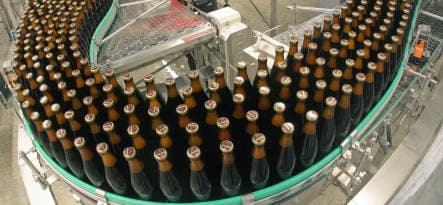German industrial output falls again

German industrial production declined further in April, the ministry of industry said Friday, another sign that Europe's biggest economy is slowing down.
Output showed a surprise decrease of 0.8 percent compared to the previous month, the ministry said, the same rate as in March, which was revised lower from an initial estimate of a 0.5 percent decrease. Analysts polled by Dow Jones Newswires had expected no change in April.
The Economy Ministry said industrial orders had fallen for the fifth straight month in April, declining by 1.8 percent on a monthly basis after a fall of 0.5 percent in March.
Weak construction activity weighed in particular on the results released on Friday, with output decreasing by 2.9 percent after a mild winter moved up work that would normally rebound in the spring. But manufacturing activity also fell by 0.7 percent, and energy output shed 1.7 percent following a gain of 3.4 percent in March.
The ministry presented two-month data designed to smooth out potential discrepancies, and these showed that overall industrial production in March and April had fallen by 1.2 percent from the January-February period.
An annual comparison revealed however that industrial activity had gained 4.5 percent in March and April compared with the same period in 2007. The figures suggested the German economy was headed for a slowdown following a first quarter that was surprisingly strong.
"In the coming months, one must expect slightly more restrained production," a ministry statement said.
At Capital Economics, European economist Jennifer McKeown said the April drop was "a clear sign that the previously strong (industrial) sector is beginning to falter."
For Andreas Rees at UniCredit Markets: "The signs of a slowdown even in the so far resilient manufacturing sector are unmistakable."
Bank of America's Holger Schmieding said bluntly: "The boom is over. Just as the European Central Bank is shocking markets by pointing to a rate increase in July, the pillars of the economic upswing are crumbling."
On Thursday, ECB president Jean-Claude Trichet caught markets by surprise when he said the bank might raise its main lending rate slightly next month to contain expectations that eurozone inflation could leap higher than the record 3.6 percent posted in May.
That would dampen economic activity, which Schmieding forecast would now "expand hardly at all in the next two quarters," since German manufacturing had been the main reason why eurozone growth had thus far proven resilient to high oil prices, a rise of the euro against the dollar and tighter credit conditions.
Comments
See Also
Output showed a surprise decrease of 0.8 percent compared to the previous month, the ministry said, the same rate as in March, which was revised lower from an initial estimate of a 0.5 percent decrease. Analysts polled by Dow Jones Newswires had expected no change in April.
The Economy Ministry said industrial orders had fallen for the fifth straight month in April, declining by 1.8 percent on a monthly basis after a fall of 0.5 percent in March.
Weak construction activity weighed in particular on the results released on Friday, with output decreasing by 2.9 percent after a mild winter moved up work that would normally rebound in the spring. But manufacturing activity also fell by 0.7 percent, and energy output shed 1.7 percent following a gain of 3.4 percent in March.
The ministry presented two-month data designed to smooth out potential discrepancies, and these showed that overall industrial production in March and April had fallen by 1.2 percent from the January-February period.
An annual comparison revealed however that industrial activity had gained 4.5 percent in March and April compared with the same period in 2007. The figures suggested the German economy was headed for a slowdown following a first quarter that was surprisingly strong.
"In the coming months, one must expect slightly more restrained production," a ministry statement said.
At Capital Economics, European economist Jennifer McKeown said the April drop was "a clear sign that the previously strong (industrial) sector is beginning to falter."
For Andreas Rees at UniCredit Markets: "The signs of a slowdown even in the so far resilient manufacturing sector are unmistakable."
Bank of America's Holger Schmieding said bluntly: "The boom is over. Just as the European Central Bank is shocking markets by pointing to a rate increase in July, the pillars of the economic upswing are crumbling."
On Thursday, ECB president Jean-Claude Trichet caught markets by surprise when he said the bank might raise its main lending rate slightly next month to contain expectations that eurozone inflation could leap higher than the record 3.6 percent posted in May.
That would dampen economic activity, which Schmieding forecast would now "expand hardly at all in the next two quarters," since German manufacturing had been the main reason why eurozone growth had thus far proven resilient to high oil prices, a rise of the euro against the dollar and tighter credit conditions.
Join the conversation in our comments section below. Share your own views and experience and if you have a question or suggestion for our journalists then email us at [email protected].
Please keep comments civil, constructive and on topic – and make sure to read our terms of use before getting involved.
Please log in here to leave a comment.